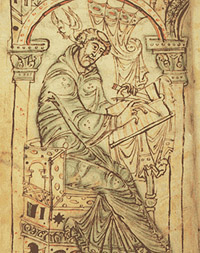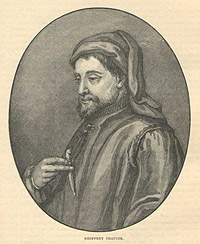 username@email.com
username@email.com
This section will provide a brief history of the English language including vocabulary, a number of etymological perspectives, and an overview of important Greek, Latin, and Anglo-Saxon affixes and roots.
Conquering English: The Beginning to 1066
The roots of the English language can be traced to the various Germanic tribes who immigrated to Britain to fight and trade with the Romans, who ruled Britain from 43 – 410 CE. The Romans allowed the Angles, Saxons, and others to trade with Britain but not to settle there. During this period, simple English words such as cook, mile, street, and wine came into being. In the early fifth century, the Romans were called back to Rome. When the Romans left, the military went with them, and the Celtic tribes they had ruled became vulnerable to invasion. By 600 CE, England was ruled by the Anglo-Saxons. The Celts were pushed west to Wales and north to Scotland.
In 787 CE, groups of Danes and Norwegians began to attack the east coast of Britain. Most of the Norse who came to England settled in the east. King Alfred the Great fought hard against the Norse to keep them from conquering all of England. His success earned him his title. The Treaty of Wedmore in 868 established the Danelaw, which gave the eastern half of England to the Danes, but guaranteed that the English who lived there were to be treated as full citizens.
Many Norse words entered the English language at this time, including words illustrative of the intimate, probably familial, contact between the two groups. The English not only adopted Norse vocabulary words such as take and law but also the pronoun they, the verb form are, and the preposition until, among various other function words. Because both the Norse and the English languages were Germanic in origin, two words with the same meaning often gained different meanings. Here is a list of such pairs: school/shoal, skirt/shirt, and scale/shell. The Norse words sky, scrape, skill, and skin replaced their Anglo-Saxon counterparts.
 Most of the literature from this time is in the form of anonymously written alliterative poetry, part of a family of verse forms whose origins trace back to the earliest literary documents of the old Germanic languages. Common features of alliterative poetry include linguistic elements such as strongly stressed words, or “lifts,” generous use of alliteration (when successive words or stressed syllables begin with the same consonant letter or sound), and carefully placed caesura, or audible pauses that break up lengthy lines of text. Two excellent examples of alliterative poetry are Beowulf and The Wanderer. To learn more about the literature from this time, see the comprehensive account of English history written by Saint Bede or, as he is commonly called, the Venerable Bede. His work is the Historia ecclesiastica gentis Anglorum (Ecclesiastical History of the English People). This well-known monk was recognized primarily as an author and scholar and was called the father of English history.
Most of the literature from this time is in the form of anonymously written alliterative poetry, part of a family of verse forms whose origins trace back to the earliest literary documents of the old Germanic languages. Common features of alliterative poetry include linguistic elements such as strongly stressed words, or “lifts,” generous use of alliteration (when successive words or stressed syllables begin with the same consonant letter or sound), and carefully placed caesura, or audible pauses that break up lengthy lines of text. Two excellent examples of alliterative poetry are Beowulf and The Wanderer. To learn more about the literature from this time, see the comprehensive account of English history written by Saint Bede or, as he is commonly called, the Venerable Bede. His work is the Historia ecclesiastica gentis Anglorum (Ecclesiastical History of the English People). This well-known monk was recognized primarily as an author and scholar and was called the father of English history.And now, a review question:
The person who deserves credit for keeping English alive at this time was
Conquered English: 1066 to c. 1500
The invasion of England in 1066 traditionally marks the transition from the Anglo-Saxon period to the Middle English period. William the Conqueror, duke of Normandy, brought his Norman knights and Norman army to England. After the conquest, he encouraged his men to take Anglo-Saxon wives. Normandy and Brittany were then considered part of England. Norman French became the language of sophistication and privilege, as evidenced by the vocabulary adopted by the English: cooking terms (venison, beef, poultry) and law terms (verdict, indict, jury) are two good examples of semantic areas where French was preferred.
In 1204, King John lost Normandy to Paris. Around 1362, English finally gained acceptance and even supplanted French as the language of the court and Parliament. This change came about partly as a result of the bubonic plague, which struck people living in tight quarters such as cities and monasteries. Along with horrific numbers of casualties, the Black Death, as the plague pandemic was called, brought the first major social upheaval in England.
One aspect of that upheaval happened toward the end of the fourteenth century. The Great Vowel Shift represented a change in the pronunciation of long vowels. The Great Vowel Shift started in southwestern England, then rolled west and north until the end of the fifteenth century. (It did not affect Wales or Scotland). This vowel shift altered the modern pronunciations of words such as mouse and nice from their original moose and niece.
Linguists often use the Great Vowel Shift to mark the transition from Middle English to modern English. The speed with which the shift took place is still a mystery to linguists and cultural historians, although a prevailing theory postulates that the mass immigration to southeast England after the Black Death caused groups with various accents to modify their speech.
Two other dates mark the close of the Middle English period: 1476 and 1485. In 1476, William Caxton brought the printing press to England. This led to the standardization of language, especially spelling, and an enormous increase in literacy. In 1485, Henry the VII ended the War of the Roses and united England under the Tudor Dynasty. Political stability launched a new era for England and the English language.
The most important author at this time was Geoffrey Chaucer. While living in London in the late fourteenth century, he wrote a number of poems in English, whereas his peers, such as John Gower, wrote in English, Latin, and French. In western England at the same time, authors demonstrated that the alliterative tradition hadn’t died. An unknown author wrote the great poem Sir Gawain and the Green Knight, while William Langland wrote the poem Piers Plowman.

An illustration of Chaucer from Cassell’s History of England, 1902
Here’s a question for review:
Which event ushered in the standardization of English?
The Empire of English: c. 1500 to the Present
By the sixteenth century, the English language was poised to enter the world stage. The Renaissance came to England, and the scholars of the time enthusiastically created new words from the esteemed classical languages, Greek and Latin, and infused the native word hoard with so-called inkhorn terms. These new entries numbered in the tens of thousands, but very few have survived. Among the survivors are educate, mundane, celebrate, confidence, and verbosity .
Under Elizabeth I, England—and English—began gaining new territories, including the colonies that would later revolt and form the United Stated of America, and colonies in West Africa that would become an integral part of the slave trade. Two works printed during this time helped to further standardize the English language: the King James Bible (1611) and Samuel Johnson’s A Dictionary of the English Language (1755).
The thirteen American colonies were the first to break away from England and establish a national language that became synonymous with establishing a national identity. In 1828, American Noah Webster published An American Dictionary of the English Language.
By the beginning of the twentieth century, the British Empire had reached its peak, but it could no longer sustain itself. Following World War II, British colonies gained independence, and the British Empire slowly declined. But English held sway as a world language, because the United States rose to take Britain’s place as a world power. English is currently the most widely studied second language in the world. It is the main language used in air traffic control, the sciences, and the computer industry.